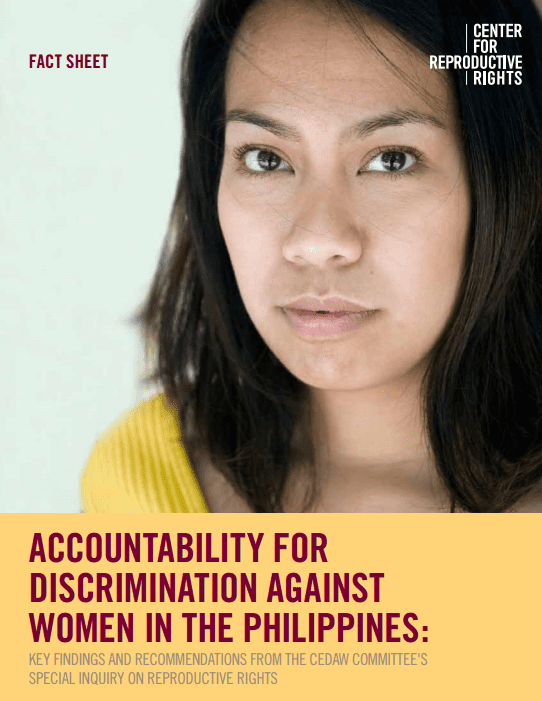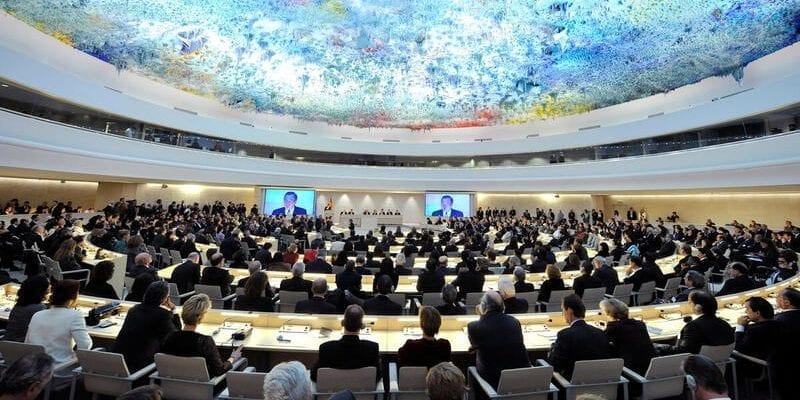Submission to the UN Assesses the Philippines’ Progress on SRHR Issues
Report to the UPR Working Group by the Center and its partners cites barriers and recommends improvements in access to services including contraception, maternal health, abortion, and adolescent sex education.

The government of the Philippines has fallen short of its obligations to improve access to sexual and reproductive health services, according to a submission made by the Center for Reproductive Rights and its partners to the Universal Periodic Review (UPR) Working Group of the U.N. Human Rights Council.
The report, titled “Report on Philippines’ Compliance with its Human Rights Obligations in the Area of Sexual and Reproductive Health and Rights,” was submitted on March 29 for the 41st session of the UPR Working Group scheduled for October 2022.
What is a Universal Periodic Review?
The Universal Periodic Review (UPR) is a comprehensive human rights review that takes place for each country before the UN Human Rights Council, usually every four years.
In assessing the Philippines’ compliance with the recommendations that the government accepted and took note of during the third Universal Periodic Review cycle in 2017, the report found that the government has failed to provide adequate access to sexual and reproductive health services. The report offers recommendations to improve access to family planning and contraceptive services, maternal health care, and safe and legal abortion care, and to remove existing barriers to sexual and reproductive healthcare, particularly for adolescents.
In particular, the UPR report analyzed the implementation of the Responsible Parenthood and Reproductive Health Act, 2012 (“RPRHA”) and the significant legal, policy and practical barriers to the following issues:
- Access to the complete range of contraceptive services and information.
- Adolescents’ sexual and reproductive health rights.
- Access to maternal health care.
- Access to safe and legal abortion and quality post-abortion care.
The report states that the government of the Philippines has infringed a series of human rights as a result of its failure to protect and affirm Filipinos’ SRHR, and that the COVID-19 pandemic has increased the severity of the infringements.
The report outlines findings in these areas:
Contraceptive Services and Information, Including Modern and Emergency Contraception
Family planning and contraceptive access was severely affected worldwide due to the coronavirus pandemic. In 2020, WHO found that family planning and contraception were among the most disrupted services. Similarly, the Philippine Department of Health found that a significant number of hospitals in the country had to prioritize COVID-19 services, and, as a result, delayed the provision of other essential health services such as family planning.
Access to emergency contraceptives has been a huge issue in the Philippines. The problem is twofold: First, the lack of access to emergency contraceptive services threatens the lives of girls and women and discriminates against those who suffered sexual violence; and second, there is a lack of awareness about emergency contraceptive options among Filipinos.
In consideration of these factors, the report suggests that universal access to contraceptives—including emergency contraceptives—must be achieved and barriers that prevent access to sexual and reproductive health care must be removed.
Adolescents’ Sexual and Reproductive Health Rights
The adolescent birth rate in the Philippines exceeds the Asia Pacific average and is among the highest in the world. Access to sexual and reproductive health services and information among adolescents, however, is strikingly restrictive. To address the issue of teenage pregnancies, in 2021 the Government passed Executive Order No. 141 (EO 141), which enforced comprehensive sex education programs and other reproductive health services. However, the passage of the proposed law, titled “Prevention of Adolescent Pregnancy Act of 2020”—which calls for a comprehensive, age-appropriate sexuality education for adolescents including out-of-school youth; social protection programs for adolescent mothers, such as accessible maternal health services, workshops, and livelihood programs; as well as medical, legal and other services for those who have been subjected to sexual abuse or violence—has been stalled due to the national elections and opposition by religious and other conservative groups.
Read more.
The Imbong v. Ochoa case, a petition filed before the Supreme Court of the Philippines challenging the constitutionality of the Responsible Parenthood and Reproductive Health Act of 2012, makes access to contraceptives for minors contingent upon the consent of the parents, thereby imposing huge access barriers. Further, the COVID-19 pandemic increased unintended pregnancies, live births, and unmet family planning needs among adolescents.
The report recommends that age-appropriate sex education be provided—including for out-of-school youth—and laws and policies that impact adolescents’ sexual and reproductive rights be mindful of their evolving capabilities.
Access to Maternal Health Services
The Government passed a progressive law in 2019, the Republic Act No. 11210, increasing maternity leave from 60 to 105 days. This law covers female workers in both public and private sectors and considers situations including miscarriage or emergency termination.
Despite the law, the problem of maternal mortality and morbidity remains a serious one–especially for pregnant women who already have several children, live on low household incomes, or perform heavy household chores. Most maternal deaths are preventable with access to quality health care, but rates of maternal mortality have not improved from the last UPR. The COVID-19 pandemic has worsened the situation by reducing access to maternal health care services, which has led to an increase in home births and greater barriers to accessing pre-and post-natal care.
The report recommends that accessible and quality maternal health care must be a priority—even during the pandemic—including access to misoprostol, an essential drug that prevents postpartum hemorrhage.
Access to Safe and Legal Abortion and Quality Post-Abortion Care
Severe legal restrictions to accessing abortion care have a devastating impact on the health and rights of pregnant people, including an increase in maternal deaths and hospitalization due to complications arising from unsafe abortions. Rather than remedying these issues, the government, most recently, has made abortion access more restrictive by increasing the fine for pharmacists found guilty of dispensing abortifacients without prescription, as well as by declaring “abortion paraphernalia” banned customs items.
The existing legal, policy and cultural barriers to abortion access have also prejudiced access to post-abortion care. This manifests in poor post-abortion health care infrastructure, discriminatory treatment by health services providers, and fear of being arrested for seeking and providing abortions.
The report urges that abortion must be completely decriminalized and must be reframed as an essential health intervention. Further, timely and quality access to abortion care must be ensured.
Read the complete UPR submission here:


